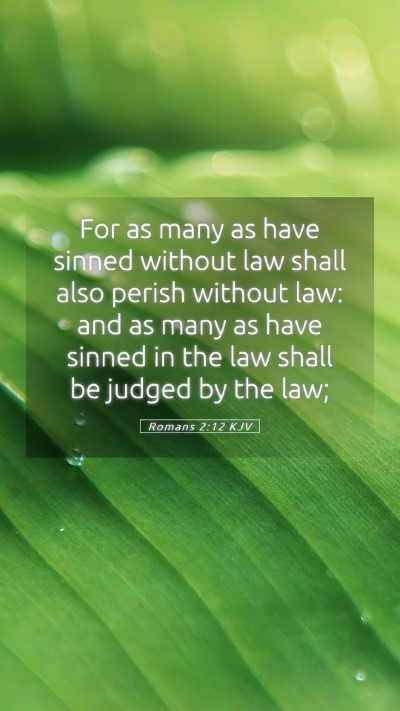Understanding Romans 2:12 - Summary of Biblical Insights
Romans 2:12 reads: “For as many as have sinned without law shall also perish without law: and as many as have sinned in the law shall be judged by the law.” This verse addresses key themes concerning sin, judgment, and the moral law, which are essential for a deeper grasp of Scripture.
Key Themes in Romans 2:12
- Sin and Accountability: The verse emphasizes that individuals are judged based on their knowledge and obedience to God's law.
- The Nature of Judgment: It highlights that judgment is impartial, correlating with one's relationship to the law.
- Universal Accountability: Indicates that everyone, regardless of their law knowledge, has a moral responsibility.
Commentary Analysis
Insights from various public domain commentators enhance our understanding of this verse:
Matthew Henry's Commentary
Matthew Henry explains that this verse illustrates God's justice. Those who have sinned without the law will not experience the same judgment as those under the law. It conveys the idea that God’s judgment aligns with the light they have received—whether through the written law or the law of conscience.
Albert Barnes' Notes on the Bible
Albert Barnes elaborates that this verse shows the impartiality of divine justice. He notes that the Gentiles, who live without the Mosaic Law, will be judged by their responses to their own understanding of right and wrong, reflecting God's fair dealings with all humanity.
Adam Clarke's Commentary
Adam Clarke mentions that the verse asserts the different standards by which people will be judged. He indicates that although some may not have the law, their actions will determine their fate, emphasizing God's overarching justice in evaluating human behavior across civilizations.
Theological Implications
Romans 2:12 suggests profound implications for Bible verse meaning and understanding Scripture:
- Moral Responsibility: This verse underlines the necessity of moral integrity, regardless of law possession.
- God's Justice: It affirms the concept that God's judgment is consistent and based on knowledge and culpability.
- Inclusive Judgment: All will ultimately be held accountable before God, whether they had received the law or not.
Practical Applications
This verse can be applied within Bible study groups and during online Bible study sessions as follows:
- **Encourage discussions** on personal moral standards and their alignment with biblical teachings.
- **Explore historical context** to understand the implications that the law had during Paul’s ministry.
- **Challenge participants** to consider how the knowledge of God’s expectations influences their daily lives.
Cross References
Romans 2:12 is related to the following verses:
- James 2:13: “For he shall have judgment without mercy, that hath showed no mercy; and mercy rejoiceth against judgment.”
- 1 Peter 4:5: “Who shall give account to him that is ready to judge the quick and the dead.”
- Galatians 6:7: “Be not deceived; God is not mocked: for whatsoever a man soweth, that shall he also reap.”
Conclusion
In summary, Romans 2:12 offers significant insights into the nature of sin and judgment, emphasizing God's fairness and the universal nature of accountability. Through careful Bible verse interpretations and commentary analysis, believers can cultivate a richer understanding of the divine expectations in their lives.


